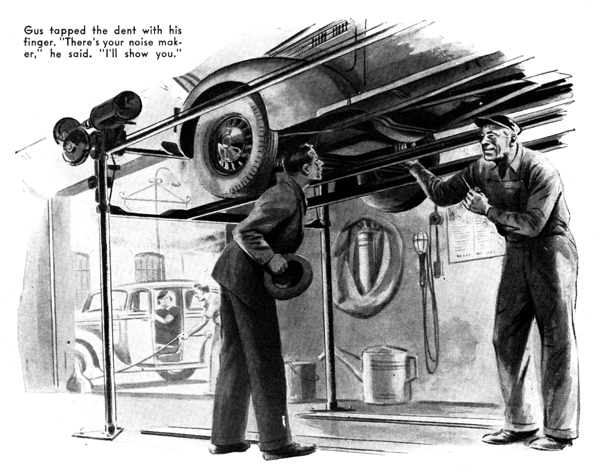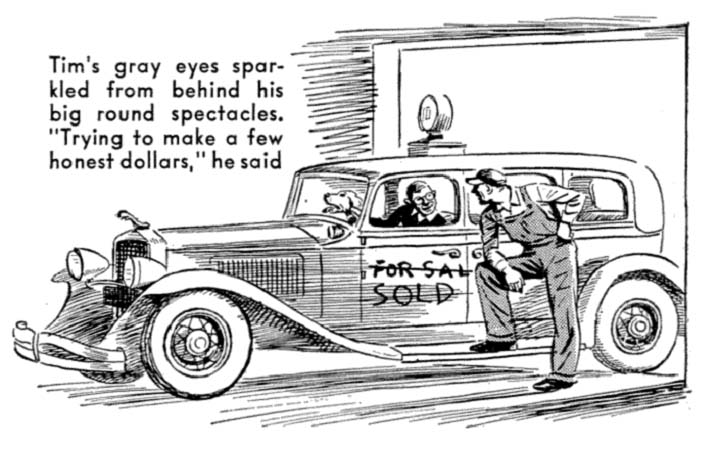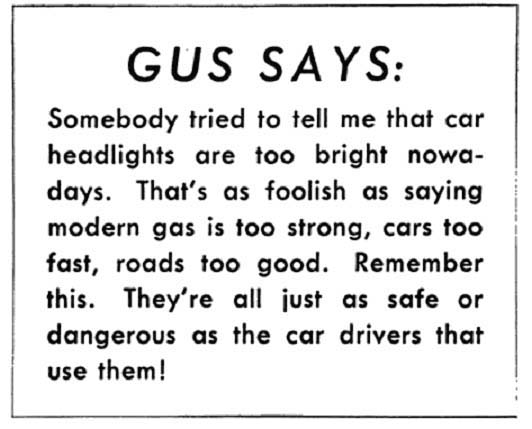September 1940
by Martin Bunn

The tan-colored roadster on the Model Garage's greasing rack was five years old and it wasn't of an expensive make, but Gus Wilson nodded satisfaction when he looked at it. Then he turned to the brisk-looking young man who had brought the job in.
"That's the way I like to see a car kept," he observed. "Shows that the owner had had sense enough to learn something about the machine he's driving, and that he isn't afraid of getting a little oil and grease on his hands. Without even stepping on the starter, I'm willing to bet you get good mileage out of the gas you burn, and that your engine does its job without making a lot of noise about it."
The young man laughed bitterly. "You'd win on the gas end of your bet," he said, "but you'd lose on the noise end. That engine does make a noise -- a queer sort of noise that I've spent a lot of hours and quite a few dollars trying to kill. But I've never been able to even locate it, let alone kill it. It's annoying but it doesn't affect the car's performance."
"That so?" Gus said, immediately interested. "How come?"
"I bought the bus when it was three years old, and it had about thirty thousand on its clock. I had new piston rings installed, spent several evenings getting everything else in first-class condition and then started off on a two-week vacation trip. The first hundred miles or so were swell -- no trouble at all. Then I began to hear that noise -- a light tapping. It sounded to me like a valve stem chattering in its guide. I looked it over as thoroughly as I could on the road, but didn't find anything wrong. So I went on. So did the noise! But the car continued to run all right.
"That evening I checked things more thoroughly, but I couldn't find a thing wrong. Next morning it was the same as it had been the day before -- not a sound for a couple of hours, and then that tapping again. It was like that every day for two weeks, and it darned near ruined my vacation.
"As soon as I got home I had the car gone over by the people who had installed the new rings. They said that the noise was caused by the push rods, which were worn and should be replaced. So I had them put in new push rods. Same thing all over again -- I'd start out all right, but after I'd been driving a couple of hours the tapping would start.
"Since then I've had the car in a dozen shops, but no one has been able to find the cause of that noise. Now I've given up looking for it. But at that it still bothers me."
"Sure -- it would," Gus sympathized. "You never hear it until you've been driving a couple of hours, hey? That looks as if -- " He broke off, went over to the car, walked under the greasing rack, and ran a fore-finger over a small dent in the lower flywheel cover. "That's been there ever since before I bought the bus," the owner told him. "The first fellow who had her must have dented it driving in a deep rut -- or maybe a heavy rock hit the cover."
Gus nodded. "That noise you were telling me about," he said. "Is it any louder when you're doing fifty than it is when you're going about thirty?"
"Not much louder," the young man said, "But the tap seems to be a lot faster when I'm going fast. At fifty the noise sounds continuous."
Gus tapped the dent with his finger. "There's your noise maker," he said. "I'll show you. Hey, Harry, get that lower flywheel cover off, will you?"
His helper took the cover off. Gus examined its inside surface carefully. Then he pointed to a small burr, on which the metal was polished bright by friction. "There it is," he said, "A tooth on the flywheel starter ring that's maybe only a couple of thousandths of an inch higher than the others just barely touches that burr on every revolution of the wheel. I suspected something like that when you told me that the taps are closer together when you are going fast than they are when you are going slow. A noise like that always is hard to locate -- it gets magnified, and by the time it gets out to you it might be coming from anywhere in the engine. Want me to fix it" Flattening out the burr and putting a little weld in the cover will do the trick."
"There's something I don't understand," the young man hesitated. "Why is it that I never hear the noise until I've driven a hundred miles or so?"
"Expansion," Gus told him. "That burr isn't high enough for that high tooth to hit it while the engine is fairly cool. But after a couple of hours of driving the engine gets good and hot. That causes the metal of the flywheel to expand -- and that makes the high tooth hit the burr."
The roadster's owner still looked doubtful. "I know -- you've been stuck before on this job," Gus said. "This time you needn't take a chance. If you ever hear that noise again, drive in here and I'll give you back your money."
"Go ahead and fix it," the young man said.
An hour later, tousle-headed young Tim Sheridan, his dog, Dodger, on the seat beside him, drove into the shop in a sedan of '32 vintage and disreputable appearance.
"What the heck are you up to now?" Gus greeted his favorite disciple.
Tim's gray eyes sparkled from behind his big round spectacles. "Trying to make a few honest dollars," he said. "I bought this old wreck for fifty, and I've dug up a guy who'll give me a hundred for it -- if I can make it run right. That fifty-dollar profit is exactly how much more I need to get me through my first year at Tech."
"That close? Good for you!" There was appreciation is Gus's voice. He knows how hard Tim has worked getting together the stake which will put him on the road to being able to sign "M.E." after his name.
"Well, what's the matter with the bus -- senile decay?"
"I don't know what's the matter with it," Tim admitted. "What was the matter with it was that it was so full of carbon that it knocked whenever it tried to climb a hill. I've scraped the carbon out, and greased the valves. But now it dies on me whenever I speed up the engine. It'll keep going, after a fashion, with the choke all the way out, but when I put it in -- dead!"
"Carburetor all right," Gus asked.
"Yes, I cleaned it, and adjusted it. Gas line too."
"How about the valve clearances?"
"Exactly what the book calls for."
"Then it may be the fuel pump," Gus suggested.
"That's what I thought, But it isn't the fuel pump. I put in new diaphragm. Didn't do any good."
"Yes?" Gus said, "Let's have a look,"
He examined the pump and carburetor. "Start your engine, and let it idle," he told Tim. The engine idled smoothly enough. "Huh!" Gus grunted. "Now speed her up."
Almost at once, the accelerated engine stopped.
Gus felt the nut where the gas line connected with the pump to make sure it was right. "What's this?" he demanded. He held up his hand, his thumb and forefinger were covered with some sticky substance.
"Shellac," Tim said. "I put some around the line nut to make sure it wouldn't leak."
"You did, hey?" Gus grumbled. Deftly, he dismantled the fuel pump. Then he carefully examined the check valve. "Take a look at this. See? The valve is gummed to its seat. Some of your shellac worked back into the valve seat. Clean it out thoroughly, and put in a new check valve."
Tim examined the valve intently. "You're right -- as usual," he admitted. "The valve's stuck sort of half way -- open enough to let sufficient gas flow through to keep the engine idling, but not enough to keep it running when you step on it."
It was quitting time and Gus began to wash up. Tim perched on the workbench and rolled a cigarette. "You're a good guy, Gus," he said. "I sure do need that fifty dollars, and now I'll get it."
"Forget it," Gus growled. "Anyhow, I like trouble shooting. Keeps the old bean in working order." Did I ever tell you about the hardest trouble-shooting job I ever ran up against? It was four or five years ago. An ice-cream company down in the city bought a fleet of sedan delivery cars and outfitted them with dry-ice refrigerators. Before long, they began to find the cars' transmissions dry when they inspected them, and the grease in the differential housing instead of where it belonged. The manufacturer's service man told them to pack the rear-bearing lock-ring slots with ground cork -- but that didn't do any good, and neither did anything else that they tried.
"The fellow who has charge of their garage is an old pal of mine, and when his boss began giving him real hell he called me up and asked me to go down and see if I could find the trouble.
"They were having exactly the same grief with all their cars, so I worked on only one of them. I took its transmission down, and checked every part -- O.K. I checked the alignment with the rear end -- O.K. I did everything I could think of, and every night the car came in with its transmission almost dry and the grease in the differential housing.
"I began to lose sleep over the job -- and I hate to lose sleep. One day I got down to their garage just as the car I had been working on was driven in. I got under it, and as I took out the plug to check the grease I heard a peculiar sort of hissing sound. That was the tip-off. Without saying anything to anyone, I took a small electric hand drill and drilled a very small hole in the torque tube.
"I was waiting when the car came in the next day, and I got under it in a hurry. The grease was all in the transmission, where it belonged and I knew I had the trouble licked."
"All right," Tim said. "I'll bite. What was the trouble?"
Gus grinned. "The ring and pinion gears created a suction which pulled the grease down the torque tube into the differential." He explained. "The hole I drilled killed the suction. In the next year's model the makers vented all their torque tubes. One of those little things -- easy to fix, but the hardest trouble-shooting job I've ever been up against."
END
L. Osbone 2019

